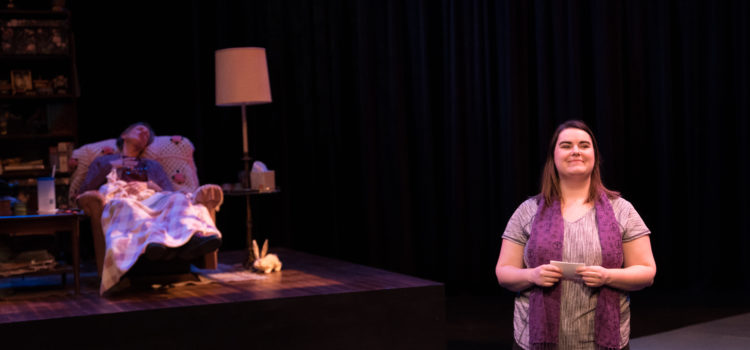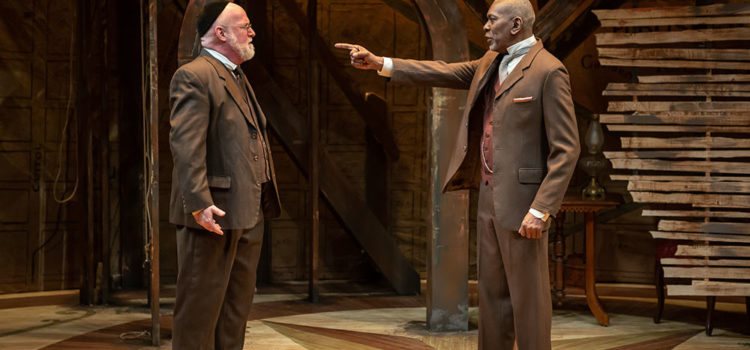By Lynn Venhaus
Managing Editor
Unexpectedly charming and heartfelt, the experimental but relatable “Well”
breaks the fourth wall just enough to easily win over the audience.
In fact, the disarming play purported to be about health
and wellness is more like a fluid, thought-provoking conversation that pulls us
in – and a running internal monologue by the lead character, playwright Lisa
Kron, about family and neighbors, and in sickness and in health.
The keen Katy Keating is endearing as the exasperated Lisa,
whose ailing mother presses all her buttons and she turns into the perpetual
angsty and whiny 13-year-old she once was and has been desperately trying to
shed that old fragile skin ever since.
Lisa tries to convince us that her latest creation –
expanded as a change of pace from her one-woman shows – is “a multi-character
theatrical exploration of issues of health and illness both in the individual
and in the community.”
But really, the complicated mother-daughter relationship is
its foundation, with a side trip into their racially integrated neighborhood in
Lansing, Mich., which was spearheaded by her compassionate, liberal mother.
Mom Ann (Lori Adams) has the usual aches and pains
associated with aging, but she suffers from some sort of undiagnosed ailment
that appears to be like chronic fatigue syndrome or fibromyalgia. She is
convinced allergies keep her homebound and infirmed.
She’s made her recliner the point of operations. She perks
up watching ice skating and giving her daughter pearls of wisdom.
Mom, in her current state, seems like a kind senior citizen
whose days pass without much consequence. But every so often, she has a burst
of energy.
As played by Adams, Ann would have been quite a Mom force in the neighborhood back in the day – and we would have taken an instant shine to her. Here, we wish the frail Mom would get better so she could be productive. But she’s lovable in that earth mother kind of way.
If Lisa would get out of her own way, she’d be more confident and less tied to the past. But it’s fun to see childhood memories spring from her talented castmates. And that’s a whole other tangent. She’s searching for answers that she might never be satisfied with, ever. (If she’d only listen to Mom — and herself.)
Mom tries not to intrude but does indeed pull focus in their wonderfully lived-in middle-class Midwestern-appointed living room, deftly decorated by scenic designer Bess Moynihan and props master Laura Skroska — the rabbit tchotchke! The dainty appliqued afghan!
The pair work beautifully together and convey that longstanding complex mother and daughter relationship so well.
The entire ensemble is first-rate, with Leslie Wobbe, Carl Overly Jr., Robert Thibault and Alicia Reve Like effortlessly transitioning into different characters – severely allergic patients, old neighbors, and even themselves.
But the formidable anchor is Katy, whose sincerity and natural affability carry the show. We root for her and believe in her, despite her wrestling with personal torment. Katy, who is such an intuitive performer, can go through a gamut of emotions in a nano-second.
Director Deanna Jent knows how to extract nuanced work from her players, and she has adroitly staged this show for maximum effect.
We’re engaged by the material, yes, but we’re also captivated by the production elements.
Playwright Kron is an interesting writer, allowing herself
to be transparent in her works. No wonder she won two Tony Awards for the book
and lyrics to the musical “Fun Home.” In 2004, she wrote “Well,” which was
produced off-Broadway. Two years later, it was on Broadway.
Her clever style works well in Mustard Seed Theatre’s Blackbox theater, and the production team’s attention to detail is superb, with Michael Sullivan’s lighting design and Zoe Sullivan’s sound design enhancing the setting. Costumes by Jane Sullivan are appropriate to the story.
Witty and whimsical, serious and playful, “Well” is a
multi-layered discourse that is both fresh and familiar. And it hits close to
home because of its captivating cast.
Mustard Seed Theatre presents “Well” by Lisa Kron Thursdays through Saturdays at 8 p.m. and Sundays at 2 p.m. March 1 – March 17 in the Fontbonne University Fine Arts Theatre. For more information, visit www.mustardseedtheatre.com.
Katy Keating, Carl Overly Jr. and Alicia Reve Like. Photo by Ann Auerbach.

Lynn (Zipfel) Venhaus has had a continuous byline in St. Louis metro region publications since 1978. She writes features and news for Belleville News-Democrat and contributes to St. Louis magazine and other publications.
She is a Rotten Tomatoes-approved film critic, currently reviews films for Webster-Kirkwood Times and KTRS Radio, covers entertainment for PopLifeSTL.com and co-hosts podcast PopLifeSTL.com…Presents.
She is a member of Critics Choice Association, where she serves on the women’s and marketing committees; Alliance of Women Film Journalists; and on the board of the St. Louis Film Critics Association. She is a founding and board member of the St. Louis Theater Circle.
She is retired from teaching journalism/media as an adjunct college instructor.



